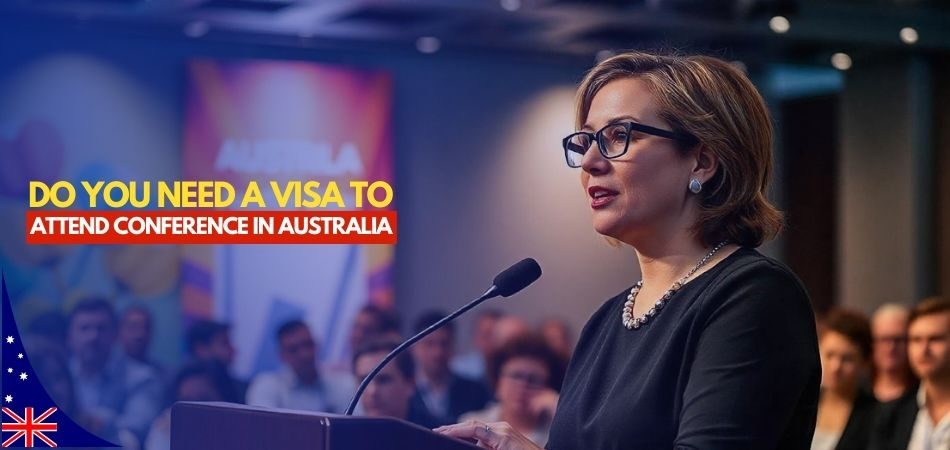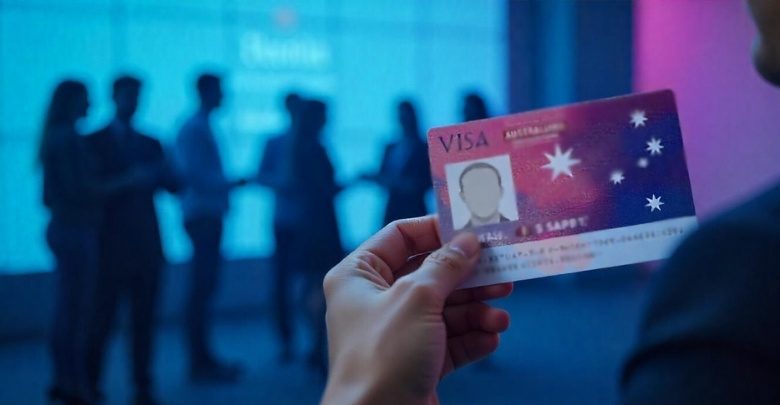A conference in Australia can be an invaluable experience, giving you access to industry leaders and valuable networking opportunities. With its rich culture and stunning surroundings, Australia is a prime destination for professionals looking to expand their horizons. However, before you book your trip, a crucial question arises: Do You Need a Visa to Attend Conference in Australia?
Yes, if you are not an Australian or New Zealand citizen, you will need a visa to attend. The specific type of visa required will depend on your passport and the purpose of your visit. Follow us as we break down the visa options, application process, and essential tips to ensure a smooth journey to your upcoming conference in Australia.
Present Scenario of Australian Conferences
Australia has become a major hub for global conferences, attracting professionals from across industries. Each year, experts gather in cities like Sydney and Melbourne to discuss the latest trends. These gatherings promote knowledge-sharing and create invaluable networking opportunities for participants from around the world.
The variety of available conferences in Australia covers fields like technology, health, education, and the environment. Organizers focus on creating engaging agendas, ensuring sessions benefit newcomers and experts alike. Participants leave with fresh insights, expanding their knowledge and professional contacts.
Australia’s appeal as a conference destination goes beyond just the sessions themselves. The country’s natural beauty and vibrant cities make it an ideal place for mixing work and travel. Attending a conference in Australia is a fulfilling experience, offering both professional growth and cultural enrichment.
Who Benefits Most by Attending a Conference in Australia?
Various professionals can benefit from attending a conference in Australia. From networking to learning new trends, conferences here provide valuable experiences. Below are the key groups who benefit most from these opportunities:
Industry Experts and Leaders
Industry experts gain exposure to fresh perspectives and new ideas. Australian conferences draw leading voices from around the world. These gatherings provide experts with opportunities to discuss and share their insights. As leaders collaborate with peers, their expertise is further enhanced.
Aspiring Professionals and Newcomers

Academic Researchers and Scholars
Researchers benefit greatly from sharing their findings with a wider audience at these events. Conferences in Australia attract diverse, knowledge-focused attendees interested in academic advancements. Presenting research can lead to collaboration opportunities and fresh ideas. As a result, scholars gain new insights, which enhances their ongoing research.
Business Owners and Entrepreneurs
Entrepreneurs find Australian conferences ideal for exploring business trends and partnership opportunities. They can showcase products or services to potential investors and collaborators. Networking at these events opens doors for expanding their ventures globally. Through industry insights, entrepreneurs can refine strategies and grow their businesses.
Government and Policy Makers
Government officials and policymakers benefit by staying informed on global industry trends. Conferences provide them with insights that shape better policies and strategies. Networking with experts improves their understanding of current issues and solutions. Such exposure allows policymakers to make more informed decisions for their sectors.
Do You Need a Visa to Attend a Conference in Australia?
Yes, you need a visa to attend a conference in Australia if you’re not an Australian or New Zealand citizen. The specific visa type required depends on your nationality, passport, and purpose of travel. The following are some benefits of having a visa:
Legal Compliance
Having a visa ensures you comply with Australia’s immigration laws. It prevents any legal issues during your stay. Attending a conference without the right visa can lead to penalties. Staying compliant allows you to enjoy your experience without worry.
Peace of Mind
A visa provides peace of mind when traveling to Australia. Knowing you have the necessary documents reduces stress. You can focus on networking and learning at the conference. This sense of security enhances your overall experience.
Access to Networking Opportunities
A valid visa allows you to connect with industry leaders and peers. Conferences in Australia attract global participants, fostering diverse interactions. Building relationships at these events can lead to future collaborations. Networking is key to professional growth and development.
Enhanced Professional Development
Attending conferences with the proper visa supports your professional development. You gain access to workshops, seminars, and discussions. Learning from experts in your field broadens your knowledge base. Such experiences can significantly impact your career trajectory.
Cultural Experience
A visa allows you to explore Australian culture beyond the conference. You can visit local attractions and enjoy unique experiences. Engaging with the community enriches your understanding of different perspectives. Experiencing Australia adds value to your professional journey.
Opportunities for Future Travel
Having a visa opens doors for future visits to Australia. It establishes your credibility as a visitor. You may find more conferences to attend or business opportunities to explore. Building a connection with Australia can lead to long-term benefits in your career.
Types of Visas Required for Attending Australian Conferences
If you would like to attend a conference in Australia, you will need the right visa, depending on your situation. Knowing what types of visas are available can simplify your travel plans. Here are some visa options you should consider for your trip:
Business Visitor Visa (Subclass 600)
This visa allows you to attend conferences and business meetings. It is suitable for short-term visits to Australia. Applicants can stay in the country for up to three months. This visa is popular for those attending professional events.
Temporary Work (Short Stay) Visa (Subclass 482)
For longer conferences or work-related events, this visa is a good option. It allows you to work and attend events for up to four years. You will need a sponsor to apply for this visa. It is ideal for professionals seeking extended opportunities in Australia.
Visitor Visa (Subclass 600) for Tourism
While primarily for tourism, this visa permits attending conferences as well. It allows you to stay in Australia for up to one year. This visa option is great for combining business with leisure. Visitors can explore Australia while participating in conferences.
Electronic Travel Authority (ETA) (Subclass 601)
This visa is available for citizens of certain countries visiting Australia. It allows short visits for tourism and business, including conferences. The ETA is easy to apply for online and offers quick processing. Travelers can stay in Australia for up to three months with this visa.
E-Visitor Visa (Subclass 651)
Similar to the ETA, this visa is for citizens of European countries. It enables short visits for business purposes, including conferences. The application process is straightforward and can be done online. Holders of this visa can stay in Australia for up to three months.
Being aware of the required visa for a conference in Australia is crucial for a smooth experience. Make sure to select the right visa based on your travel needs. This knowledge helps you prepare effectively for your conference trip.
What Happens if You Don’t Have a Visa?
Traveling to Australia without a valid visa can lead to serious consequences. Knowing the implications can help you make informed decisions. Here’s what you need to know about the risks of traveling without a visa:
- Detention by Immigration Authorities: Without a visa, you may be detained by immigration officials upon arrival. This detention can last until your immigration status is resolved.
- Immediate Return to Home Country: You may be sent back to your home country if you lack a visa. This return is often at your own expense.
- Fines and Penalties: Traveling without a visa may result in fines or other penalties. Financial repercussions can add unnecessary stress to your travel plans.
- Future Visa Applications Affected: A history of traveling without a visa can impact future visa applications. Immigration authorities may view you as a higher risk.
- Limited Access to Services: Without a visa, you may have limited access to essential services in Australia. This includes healthcare and support from your embassy.
- Inability to Attend Events: Not having a visa means you cannot legally attend conferences or events. Missing out on these opportunities can affect your professional growth.
- Negative Impact on Reputation: Traveling without proper documentation can harm your professional reputation. Others in your industry may perceive you as unprofessional or careless.
Can Australian Conference Visas Be Used for Job Purposes?
No, conference visas cannot be used for job purposes in Australia. These visas are specifically designed for attending conferences and professional events. They do not allow holders to engage in employment while in the country.
Individuals attending conferences can network and learn, but they cannot work. The primary focus of a conference visa is participation in events and workshops. It’s crucial to respect the terms of the visa to avoid legal issues.
If you wish to work while attending a conference, consider applying for a different visa. The eligibility of working with a conference visa in Australia is limited. Always check visa requirements and conditions to ensure compliance with immigration laws.
Tips for a Smooth Visa Application Process
Applying for a visa can be a straightforward process with the right approach. Proper preparation can help ensure a smooth application experience. Here are some tips to guide you through the visa application process.
- Gather Required Documents: Ensure you have all the necessary documents before starting your application. This includes your passport, invitation letters, and proof of funds.
- Complete Application Forms Carefully: Fill out all application forms accurately and completely. Double-check for any errors or missing information to avoid delays.
- Check Visa Processing Times: Be aware of the processing times for your visa category. Submitting your application early can help prevent last-minute issues.
- Seek Professional Advice: If unsure about any part of the process, consider consulting a migration agent. Their expertise can provide valuable insights and assistance.
- Prepare for Interviews: If required, be ready for a visa interview by practicing common questions. Present yourself professionally to make a positive impression.
- Follow Up on Your Application: After submitting your application, keep track of its status. Regularly check for any updates or additional requests from immigration authorities.
- Stay Informed About Visa Policies: Keep yourself updated on any changes in visa policies or requirements. Being informed can help you manage the process more smoothly.
FAQs About Do You Need a Visa to Attend Conference in Australia?
If you’re planning to attend a conference in Australia, you may have several questions regarding visa requirements and travel logistics. The following FAQs provide essential information to help you navigate the process and ensure a successful trip.
How Long Does The Visa Application Process Take?
The visa application process duration can vary depending on several factors. Generally, it can take anywhere from a few days to several weeks, depending on the visa type and the volume of applications at the time. To avoid last-minute issues, it’s advisable to apply as early as possible once your conference plans are confirmed.
Is there a Fee for Applying for an Australian Visa?
Yes, there is usually a fee associated with applying for an Australian visa. The fee amount varies depending on the specific visa type you are applying for, such as the Business Visitor Visa or the Electronic Travel Authority (ETA). Ensure you check the current fees on the official Australian immigration website before submitting your application.
What Should I Do if My Visa Application Is Denied?
If your visa application is denied, you will receive a notification detailing the reasons for the denial. It is essential to carefully read this information to understand what went wrong. Depending on the circumstances, you may have the option to appeal the decision or reapply after addressing the issues mentioned in the denial.
Can I Apply for a Visa on Arrival in Australia?
No, you cannot apply for a visa on arrival in Australia; all travelers must have a valid visa before entering the country. It is essential to ensure that you complete your visa application and receive approval before booking your travel arrangements. Make sure to plan ahead and allow enough time for processing.
Can I Apply for Multiple Visas for Different Conferences?
Yes, you can apply for multiple visas for different conferences, but each application must meet specific requirements. Each visa application should detail the purpose of the visit and provide documentation to support your attendance. Be mindful of the conditions and validity periods of each visa to maintain compliance with Australian immigration laws.
Conclusion
Conferences in Australia can greatly enhance your professional development. However, understanding visa requirements is crucial. So, do you need a visa to attend a conference in Australia? Yes, if you are not an Australian or New Zealand citizen, securing the appropriate visa is essential for a smooth experience. Various visa options are available for different needs, such as the Business Visitor Visa and the Temporary Work Visa.
Ensuring compliance with immigration laws not only prevents legal issues but also provides peace of mind. By preparing thoroughly and following the right procedures, you can fully enjoy the opportunities that Australian conferences offer for networking and growth.







